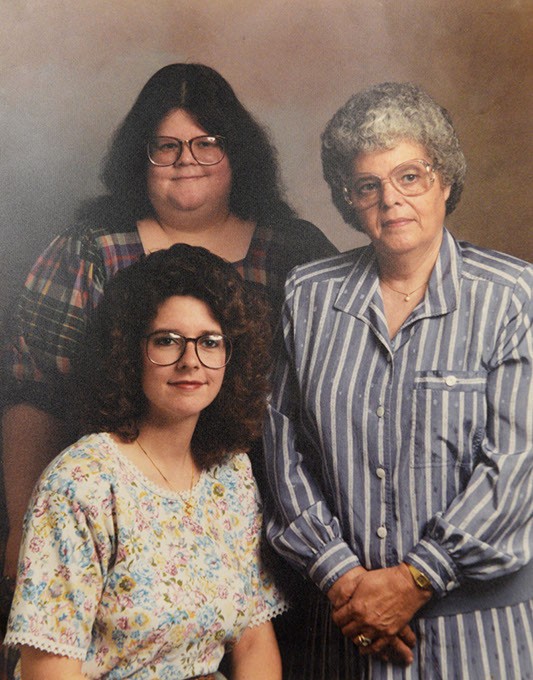Editor’s note: Weighed Down is an Oklahoma Gazette series about health, weight loss, treatments, behaviors and the paths and challenges of sustainable success.
“I’ve tried every diet in the world, and every time I make a mistake and experience failure, like gain five pounds overnight, I quit,” Sarah Creech said during a recent Oklahoma Gazette phone interview.
She also said she’s pleased with her 5-foot-1-inch weight of 220 pounds. It took her three years to get there after tipping the scale at 430 pounds.
As an Oklahoman, Creech is not alone in her struggle with weight.
The Sooner State now has the eighth-highest obesity rate in the country, according to the State of Obesity: Better Policies for a Healthier America report released in September.
Heavy consequences
Nearly 7 in 10 adults age 20 and older in Oklahoma are overweight, up from 20 percent in 2000 and just 10 percent in 1990, the State of Obesity report shows. Of that number, 38 percent are obese, meaning their body mass index (BMI) is greater than 35. BMI measures body fat determined by an equation using height and weight. A normal BMI is 20-25. Anyone with a BMI over 40 is considered morbidly obese, also recognized as more than 100 pounds over national weight guidelines.These numbers tell us we are in the midst of an epidemic. This illness is not carried by a vector or transmittable from one person to the next. Obesity is a health crisis that is now considered a disease process all its own. For some, it might begin slowly, be considered a nuisance, be denied as a true health threat and categorized as something that registers but is unappreciated for its ability to spiral out of control.
For others, being overweight might be the only state they have ever known. Either way, obesity contributes to life-threatening illnesses: diabetes, high blood pressure, heart and gallbladder disease, arthritis, sleep apnea and even cancer.
Tracking progress
Weight management is an individualized treatment course. What works for one person might not work for another. A variety of stressors contribute to it, and unless someone is willing to examine unique challenges, there is little hope for sustained change.Lori Manning, a registered dietitian at Mercy Hospital, has worked with weight loss patients for 20 years. Her passion for her work is clear as she discusses the subject. She believes everyone can achieve healthy, sustainable weight loss but quickly points out there are no quick fixes and success requires a lifetime commitment.
“Emotional eating is a huge part for most of the people I see — it isn’t necessarily always food selection,” Manning explained. “Sometimes it’s how often they’re eating and how much they’re eating and the reasons behind that. We figure out what’s driving the eating and ask questions like ‘Is it more emotional versus hunger pain?’”
Manning’s practice includes one-on-one weight management sessions. In the beginning, she has patients use a calorie counting app to teach them to be more aware of what kinds of calories they take in. Once they better understand how the calories add up, the apps aren’t required.
She doesn’t want her sessions to be about numbers and good food versus bad food. Her goals are to help clients know what healthy eating looks like and what emotional eating feels like. She concentrates on enabling patients to track exactly what they do in terms of food and movement on a daily basis.
Fostering awareness
The key to long-term weight loss, Manning said, is developing habits that include a balanced intake of carbohydrates, proteins, fruits and vegetables coupled with daily movement. Each patient’s program is tweaked as the hindrances to successful weight loss become obvious to the dietitian and patient in their individual sessions.“What we try to do in our office is absolutely listen. We have clients who are eating too many carbs and we go in that direction,” Manning said. “But when you have someone coming in and you think, ‘Wait. No, that’s not the issue,’ you have to individualize.”Are there any real rules? New diet crazes and trends erupt almost daily. Manning’s response is so old-school, it’s refreshing: People set themselves up for failure by chasing one diet after another instead of learning to eat healthfully and have a good relationship with food.
Food journals often point to habitual choices like carbohydrate crazes in the evening to stave off extreme hunger or eating because one feels anxiety about a bad day, a bad relationship or even a celebration and then feels entitled to splurge just a bit. She said all these responses are normal, but her patients learn, more than anything, to listen to their bodies and emotions and not confuse hunger with fear, frustration or habit.
It takes time. Slips happen. Manning said her most important message to clients when they do make a mistake is to get back to what works, get back up again and back to the road that leads to achieving and maintaining a healthy weight. Many people quit because they’re frustrated with themselves rather than accepting it’s an ongoing part of life.
Emotional health
Manning is direct in her individualized approach.“If I have someone who gets hungry between meals, we are intentional about making their meals smaller so they can eat every few hours,” she explained. “The bottom line is it will always come down to calorie intake versus expenditure — the quality of food as far as how filling it is as well as the emotional piece. Is it hunger-driven or a habit or emotion-driven?”
Manning said her clients must learn to answer these questions for themselves.
After a lifetime of struggling with her weight, Creech hit bottom in 2013 when she hit 430 pounds. The embarrassment she said she felt about being diabetic and unable to care for herself finally hit when family came to visit and she could barely get up.
Three years into her treatment, she weighs 243 pounds. The first thing she did was cut out junk food — primarily soda and fast food. But she said the biggest change she made was asking for professional help.
Manning has been Creech’s dietitian, coach and chief supporter through her treatment, refining her emotional tool kit and reminding her that anxiety, frustration at work, anger, fear and other emotions are normal and don’t need to be numbed with food.
Creech said her first and most profound lesson was portion control. As she participated in sessions with Manning, she realized the extent to which she overate.
“Lori would break out measuring cups and spoons as we looked at my food journal. I had no understanding of portion size,” Creech said. “I still carry those measuring devices in my purse, as I don’t like to eyeball anything these days.”Creech said she also prefers calories she can chew, avoiding protein shakes and beverages because for her, they are a joy killer.
Manning helped her develop coping techniques to avoid emotional eating in the midst of stress. Today, Creech knows to remove herself from the situation, get outside or go workout or even go to Wal-Mart or the library when she feels like eating after an argument or hard day at work.
Creech said she spent a lot of time pretending she was happy while, internally, she was miserable and felt isolated. A demanding federal accounting job was an ocean of stress, but she finally realized she was the only one who could change.
Today, Creech embraces a lifestyle that includes healthy food choices, an awareness of feelings that she used to numb with food and a commitment to exercise. She knows if she gains weight during a holiday relapse or even sometimes binges on sweet, sugary food, she can move on and get back to what she knows works.
It takes time and commitment.
As Manning often reminds her clients, weight loss is a personal journey and people have to find what works for them.
Coming up: Weighed Down examines weight management, hormones and diet pills before delving into a treatment many consider a more extreme measure: bariatric surgery.
About the author: Terre Cooke Chaffin is an Oklahoma City journalist, producer, writer and photographer. She specializes in physical and mental health, creativity and stories of personal growth. Her work encompasses her philosophy “Live Well Today.”
Print headline: Weighed down, Oklahoma’s obesity epidemic impacts all aspects of our daily lives, from emotional well-being and stress management to physical health.












